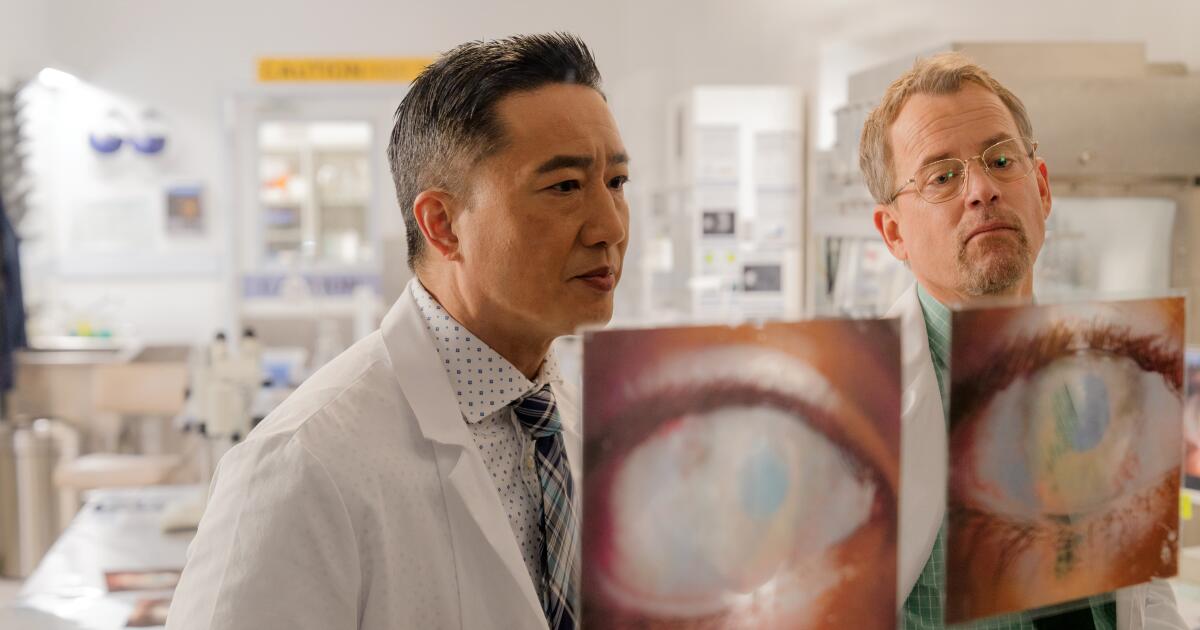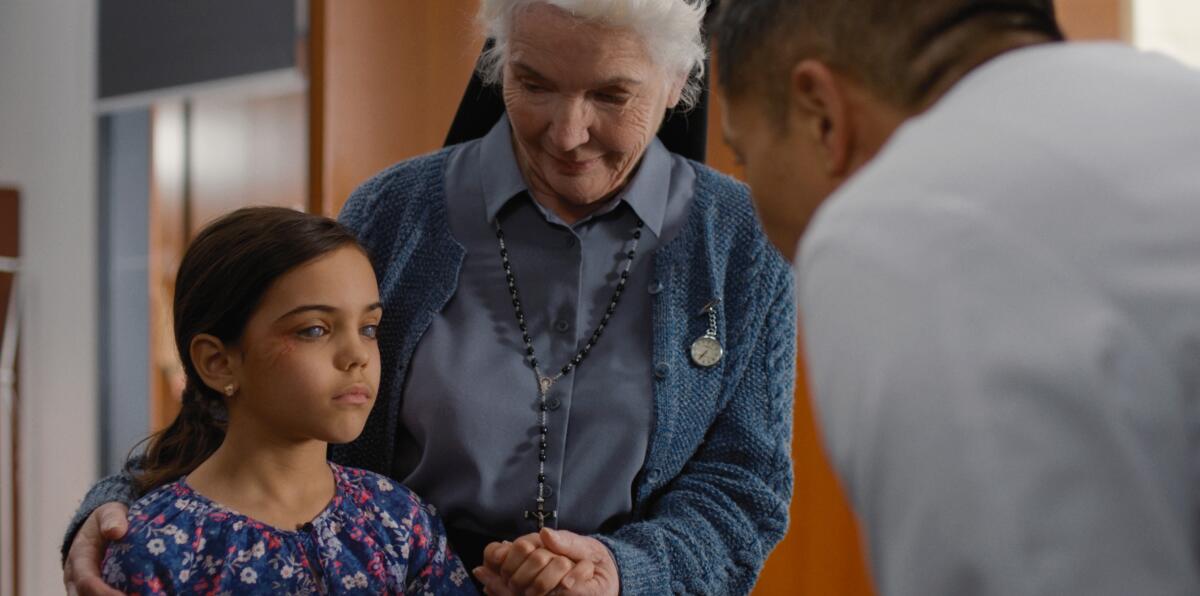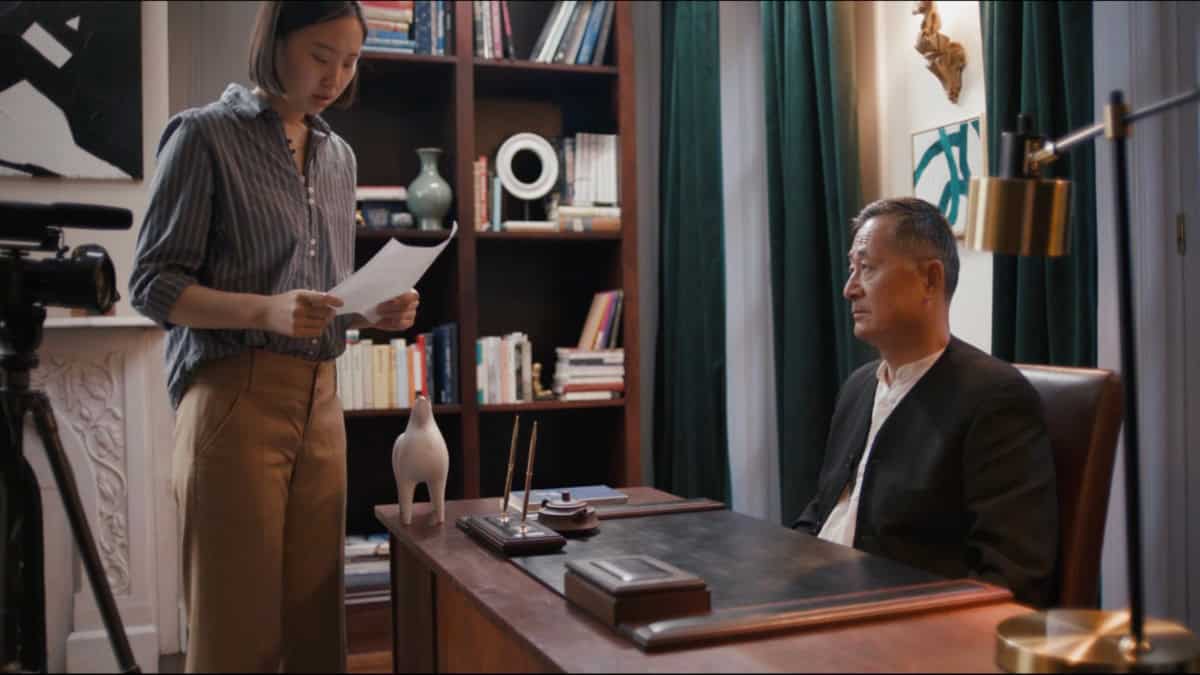Entertainment
'Sight' highlights the journey and faith of an Asian American medical hero who helped the blind see

When Dr. Ming Wang came to the United States in 1982 at 21 years old, he had nothing but $50 and a Chinese-to-English translation book. He had just survived the violent cultural revolution in China — including the loss of a dear friend — during which the government had shut down most of the universities in the country.
We see this and much more in flashbacks throughout the movie “Sight,” which is based on Dr. Wang’s autobiography “From Darkness to Sight” and opens this weekend. In it, Dr. Wang (played by Terry Chen) ends up earning medical doctorates from Harvard and MIT (graduating magna cum laude from the latter), while also earning a PhD (laser physics, University of Maryland). He discovers a new way to potentially help blind people see — using an amniotic membrane contact lens if you want to get technical — as he and his medical partner Dr. Misha Bartnovsky (played by Greg Kinnear) embark on a mission to help orphans regain their sight.
The National Library of Medicine estimates that over the last 25 years, more than 20 million eyes were treated with laser eye surgery. Dr. Wang’s pioneering medical technique has restored the eyesight of millions around the world. As one of the leading experts in the field, Dr. Wang’s impact and philanthropy have been recognized in his home state of Tennessee, but his story may not be as widely known. As Asian American and Pacific Islander Heritage Month continues, Wang, who also executive-produced the film, wants to contribute to the storytelling tapestry of this country.
“My main motivation? Asian American stories are not told in American mainstream media too often. Authentic representation is a rare occurrence. I wanted to encourage Asian Americans, Chinese Americans and all immigrants to tell our story,” says Wang. “I will say, though, it’s a humbling experience.”
Ming Wang at 14 (Ben Wang) and Lili (Sara Ye) in “Sight.”
(Courtesy of Angel Studios)
Chen, a Canadian actor, was not only struck by Dr. Wang’s medical accomplishments, but also by the general and specific nature of his tale.
“It had nothing to do with kung fu or martial arts. It had nothing to do with being a gang member or any of the other tropes Hollywood has tripped over. And it also spoke to a larger swath of the immigrant story and the larger diaspora that exists outside of Asia,” says Chen.
Directed by Andrew Hyatt, and also starring Ben Wang, Fionnula Flanagan and Natasha Mumba, the film had the benefit of having Dr. Wang on the set. He was there to help consult on the technical jargon and operating room scenes, but many in the crew took advantage of his presence to ask for advice on medical issues. It was a welcome assurance on a 2020 set that was in the midst of working through a pandemic.
“Dr. Wang was a great resource to have,” says Kinnear. “This is the first movie that I did, that many of us did, after COVID. I kind of had a little bit of hesitation about the journey, but I felt like when I read Dr. Wang’s story, it put everything into perspective very quickly.”
The inspirational nature of the story may have even helped the mood on the set as well.
“When you finally go and you meet everybody and they slowly peel down their masks … I have to say that in the case of this film, [the substance of the story] did trickle down. There was an inspiring good feeling on the set,” says Kinnear.

Kajal (Mia Swaminathan), Sister Marie (Fionnula Flanagan) and Dr. Wang (Terry Chen) in “Sight.”
(Courtesy of Angel Studios)
In the film, Dr. Wang tries to restore the sight of a young girl named Kajal (Mia Swaminathan) who is brought to his clinic by a nun ( Flanagan). It is one of the many touches in the film that put faith at the center of Dr. Wang’s struggles and his triumphs. This particular case is one that led to his revelation about using the placenta to create his curative lens, but it was also a case/client that tested his resolve.
“The reason that Kajal was chosen [to be the central case in the film] was because it was a very challenging case. Her injury was so severe that I had to dig deep to find a solution,” says Dr. Wang. “People say there’s no common ground between science and faith. Fortunately, I didn’t give up and as a Christian I kept praying.”
Angel Studios, known for its faith-based films, is distributing “Sight.” But its story of Dr. Wang’s past and his desire to help uplift blind orphans are themes that are just as prominent in the film.
“I think the message of the film is about freedom and faith,” says Dr. Wang. “‘Sight’ is a movie that reminds us how precious freedom is. How much we need to appreciate America. It may just take the story of an immigrant who did not have freedom to remind us how blessed we are.”

Movie Reviews
Movie review: “The Watchers”

Entertainment
How did Travis Kelce know he was falling for Taylor Swift? He offers a 'genuine' answer

Travis Kelce isn’t afraid to share his love story.
It turns out that Taylor Swift’s unexpected behavior during the Kansas City Chiefs game against the Chicago Bears in September tipped the relationship into this-is-the-real-deal territory, he said on the “Bussin’ With the Boys” podcast.
Kelce explained that they had already been seeing each other privately but that her attitude toward taking things public impressed him.
He offered her a security escort into the stadium, but she brushed it off and walked in with the rest of his guests.
“She really won me over with that one,” the tight end said, describing how Swift preferred to “be around family and friends and experience this with everybody” instead of getting celebrity treatment.
“She’s very self-aware. And I think that’s why I really started to really fall for her, was how genuine she is around friends [and] family. It can get crazy for somebody with that much attention … and she just keeps it so chill and so cool.”
The two have kept the intimate details of their relationship under wraps but are notably more public than Taylor has been with past boyfriends. Their passionate kiss after Kelce’s Super Bowl win in February effectively broke the internet, and he joined her onstage in London over the weekend, spicing up the Eras tour.
Kelce says he wants to “keep things private,” but “at the same time, I’m not here to hide anything … that’s my girl, that’s my lady.”
He did admit there have been a few downsides to entering her spotlight — notably, random fans showing up at his pad in Kansas City, Kan.
“I’ve had fun with just about every aspect of it. It’s just when you’re at home you want privacy, and you don’t always get that,” he said.
The wild online speculation is another annoyance. The athlete said that his father would come across crazy tabloid stories from time to time and call him to fact-check.
“He’d see something so f— out of the blue, like something about me and Taylor, he’s like, ‘Hey, you guys OK?’”
Kelce always has a reply at the ready: “Get the f— off Facebook, Dad.”
And for those still wondering — KillaTrav’s favorite TSwift songs are “Black Space,” “Cruel Summer” and “So High School.”
Movie Reviews
Movie Review: ‘Summer Camp’ is an entertaining disappointment

Nothing forges a friendship like treating an arrow wound. For Ginny, Mary and Nora, an ill-fated archery lesson and an injured classmate are just the beginning of the lifetime of trouble they’re about to start.
Ginny is a year above the other two, more experienced in both summer camp and girlhood, and takes it upon herself to somewhat forcefully guide her younger friends. Mary cowers in the bathroom away from her bunkmates, spouting medical facts, while Nora hangs back, out of place. When their camp counselor plucks them out of their cabin groups to place them in the new “Sassafras” cabin, they feel like they fit in somewhere for the first time.
50 years later, “Summer Camp” sees the three girls, now women, reunite for the anniversary reunion of the very same camp at which they met. Although they’ve been in touch on-and-off in the preceding decades, this will be the first time the women have seen each other in 15 years.
Between old camp crushes, childhood nemeses and the newer trials of adulthood, the three learn to understand each other, and themselves, in a way that has eluded them the entirety of their friendship.
I really wanted to like “Summer Camp.”
The opening scene, a glimpse at the girls’ first year together at Camp Pinnacle, does a good job at establishing Ginny, Mary and Nora’s dynamic. It’s sweet, funny and feels true to the experience of many adolescent girls’ friendships.
On top of that, this movie’s star-studded cast and heartwarming concept endeared me to it the moment I saw the trailer. Unfortunately, an enticing trailer is about the most “Summer Camp” has to offer.
As soon as we meet our trio as adults, things start to fall apart. It really feels like the whole movie was made to be cut into a trailer — the music is generic, shots cut abruptly between poses, places and scenes, and at one point two of the three separate shots of each woman exiting Ginny’s tour bus are repeated.
The main character and sometimes narrator, Ginny Moon, is a self-help writer who uses “therapy speak” liberally and preaches a tough-love approach to self improvement. This sometimes works perfectly for the movie’s themes but is often used to thwop the viewer over the head with a mallet labeled “WHAT THE CHARACTERS ARE THINKING” rather than letting us figure it out for ourselves.
There are glimpses of a better script — like when Mary’s husband asks her whether she was actually having fun or just being bullied, presumably by Ginny. This added some depth to her relationship with him, implying he actually does listen to her sometimes, and acknowledged the nagging feeling I’d been getting in the back of my head: “Hey, isn’t Ginny kind of mean?”
Despite all my annoyance with “Summer Camp,” there were a few things I really liked about it. I’m a lot younger than the main characters of this movie, but there were multiple points where I found myself thinking, “Hey, my aunt talks like that!” or, “Wow, he sounds just like my dad.”
The dynamic of the three main characters felt very true to life, I’ve known and been each of them at one point or another. It felt especially accurate to the relationships of girls and women, and seeing our protagonists reconcile at the end was, for me, genuinely heartwarming.
“Summer Camp” is not a movie I can recommend for quality, but if you’re looking for a lighthearted, somewhat silly romp to help you get into the summer spirit, this one will do just fine.
Other stories by Caroline
Caroline Julstrom, intern, may be reached at 218-855-5851 or cjulstrom@brainerddispatch.com.
Caroline Julstrom finished her second year at the University of Minnesota in May 2024, and started working as a summer intern for the Brainerd Dispatch in June.
-

 News1 week ago
News1 week agoIt's easy to believe young voters could back Trump at young conservative conference
-

 World1 week ago
World1 week agoSwiss summit demands 'territorial integrity' of Ukraine
-

 World1 week ago
World1 week agoProtesters in Brussels march against right-wing ideology
-

 News1 week ago
News1 week agoA fast-moving wildfire spreads north of Los Angeles, forcing evacuations
-

 World1 week ago
World1 week agoAl-Qaeda affiliate claims responsibility for June attack in Burkina Faso
-

 Movie Reviews1 week ago
Movie Reviews1 week agoShort Film Review: Willow and Wu (2024) by Kathy Meng
-

 News1 week ago
News1 week agoMass shooting at Rochester Hills splash pad: Everything we know
-

 Movie Reviews1 week ago
Movie Reviews1 week agoMovie Review: Top 5 Movies to Watch This Father's Day June 16, 2024 –













